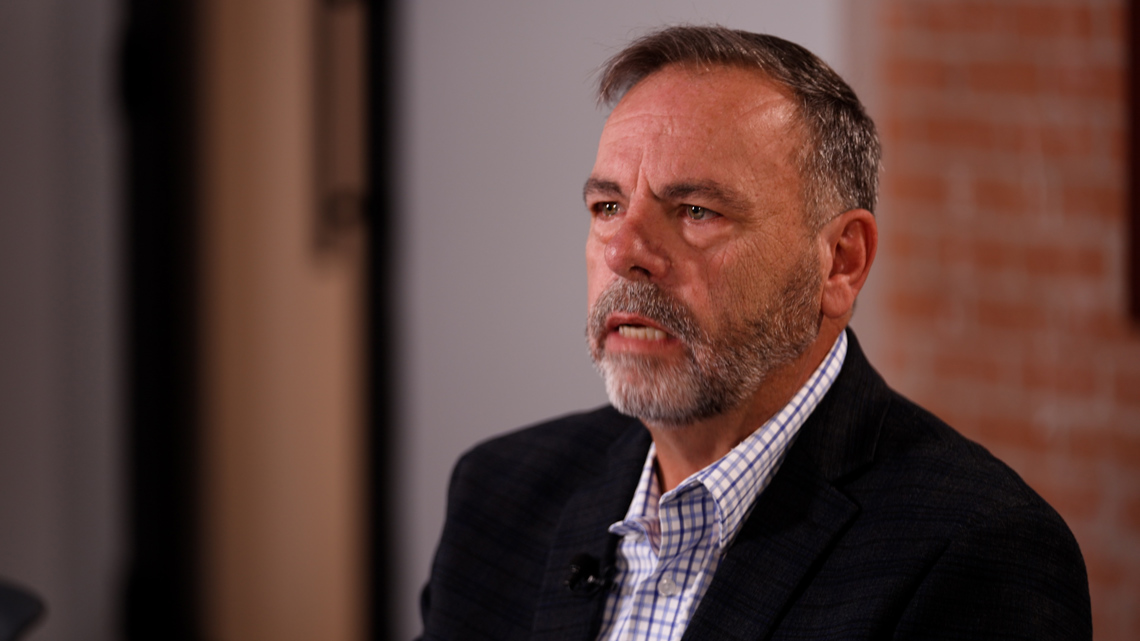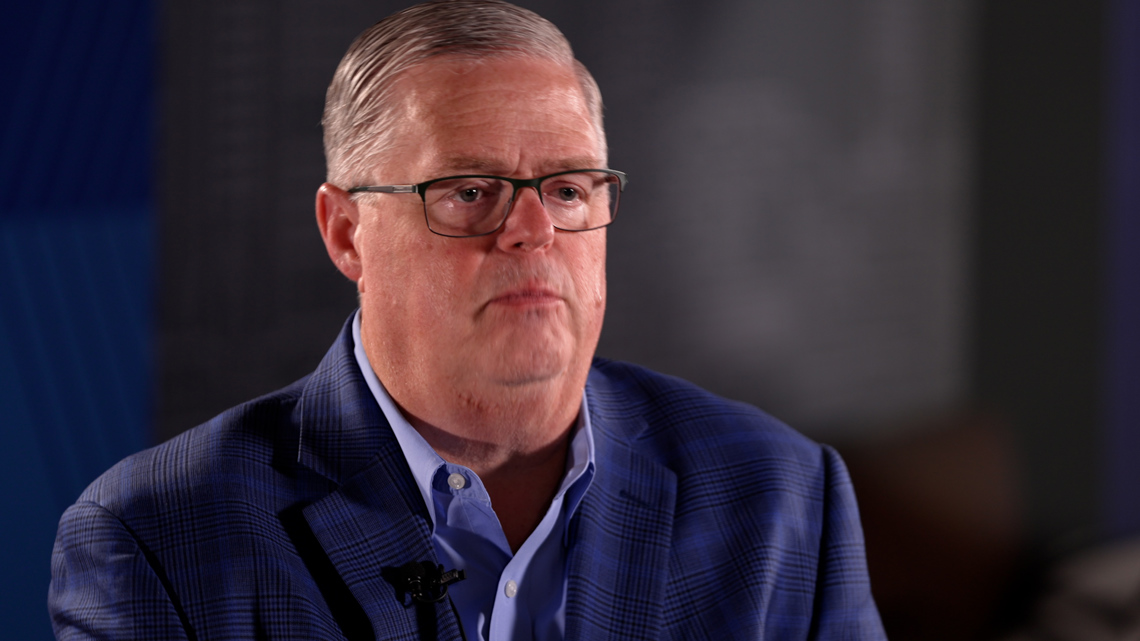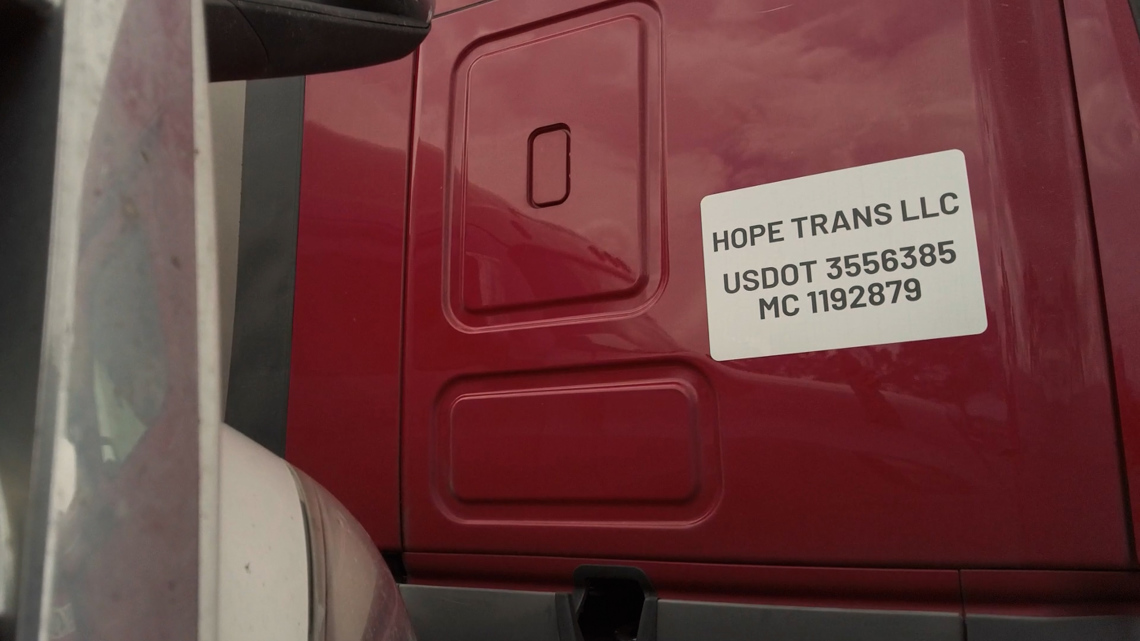Despite dozens of new safety violations, Hope Trans trucks remain on the road as regulators face criticism for rarely shutting down dangerous carriers.
DALLAS — Five people were killed in a June crash in Terrell tied to a trucking company called Hope Trans. But even after that tragedy — and dozens of new violations in just two months — the company remains on the road.
In Texas — and at least 23 other states — Hope Trans trucks have still been spotted despite the company’s connection to the deadly wreck, according to Gen Logs, a company that uses roadway cameras nationwide to track carriers.
Since the June 28 crash, Federal Motor Carrier Safety Administration records compiled by trucking analytics firm Bluewire show Hope Trans has racked up 35 safety violations in Texas and eight other states. That’s in addition to the seven violations given to the driver in the Terrell crash. FMCSA’s website lags by about a month, but companies such as Bluewire receive direct feeds of inspection data on a regular basis.
Violations included a July 16 inspection in Florida, where federal records show inspectors found the company had failed to correct defects noted on a previous report, operated a commercial motor vehicle without proof of a periodic inspection, and the driver had no record of duty status — meaning no electronic logbook of hours.
On July 1, just days after the Terrell crash, a Hope Trans driver was pulled over in Colorado and cited for making a false report of driving hours and failing to review electronic log records, according to FMCSA records.
“They can put the entire company out of business within about eight hours,” said Dale Prax, a trucking safety expert and owner of FreightValidate. “By FMCSA not shutting them down, it’s almost a dereliction of duty.”
Experts say Hope Trans is part of a pattern in the trucking industry where problem carriers stay on the road — sometimes reemerging under new names — while regulators struggle to keep up.

Rarely used power
Federal law allows the Secretary of Transportation to immediately shut down a trucking company if its continued operation “substantially increases the likelihood of serious injury or death.” It’s called an imminent hazard order, and once issued, it requires a carrier to cease all commercial motor operations.
“You don’t have to have a complete investigation,” said trucking lawyer Joe Camerlengo of Florida. “You can issue the order, and then within 10 days, the motor carrier can appeal or the driver can appeal.”
In response to questions from WFAA, a Department of Transportation spokesperson said the FMCSA had completed a compliance inspection of Hope Trans, LLC and issued the company a proposed unsatisfactory safety rating on Aug. 18.
From that date, Hope Trans has 60 days to submit a compliance plan that FMCSA accepts. If the plan is rejected—or not submitted at all—the unsatisfactory rating would go into effect in mid-October, and the company would be shut down.
FMCSA “is committed to holding unsafe carriers accountable to protect American families on our roadways,” the statement said.
The statement did not directly address why an imminent hazard order hasn’t been issued.
Between 2010 and 2015, regulators issued more than 120 imminent hazard orders for motor carriers. Over the last decade, only about 30 have been issued. In 2019 and 2020, not a single order went out.
“It’s used very sparingly,” said Steve Wilhelms, a North Texas safety expert and a nationally certified fleet safety director.
Wilhelms called the situation unacceptable.
“It’s not being used enough to put bad actors — pull their authority and park their trucks,” he said.
The reason, he said, comes down to “bureaucracy and politics.”
Wilhelms said the agency’s practice has been that when it does issue an imminent hazard order, there has already been a prior enforcement action, beyond just logging inspection failures, against that carrier.


He and other industry insiders point to a leadership vacuum. In the past decade, the agency has had a Senate-confirmed administrator for less than half the time, with leadership largely carried out by a revolving cast of acting chiefs.
“It’s an agency that’s lacked … solid, consistent leadership,” Wilhelms said.
Wilhelms, Prax and others are hopeful the situation will improve with the expected congressional confirmation of Derek Barrs, a former Florida Highway Patrol chief with nearly three decades of law enforcement experience and deep ties to the trucking industry.
The Terrell crash
In that Terrell crash, the Hope Trans driver, Alexis Osmani Gonzalez-Companioni, was hauling a U.S. Postal Service load that originated in Atlanta — more than 700 miles from the crash site.
According to FMCSA records, he was cited for seven violations, including driving beyond federal hours-of-service limits. He told investigators he fell asleep at the wheel. He now faces manslaughter and aggravated assault indictments in Kaufman County. He’s currently in the Kaufman County jail awaiting trial.
Investigators also discovered the truck carried a falsified “cab card” — the truck’s registration, records show. A company official has been indicted on a forgery charge. He has not yet been taken into custody.
Former Hope Trans drivers previously told WFAA that the company regularly altered shipping records to hide the true number of hours they had been driving. They provided WFAA with backdated shipping records.
“They didn’t care about rules or laws or violations,” said one former Hope Trans trucker. “They said, ‘Don’t worry about it. We’ll take care of that.’”
That driver also provided WFAA a photo of his company’s fuel card — bearing the name Bee Zone Logistics.
“Bee Zone? I was like, why? What is Bee Zone?” the former driver recalled. “It was a red flag.”
Experts say the reason this is a red flag is that it is evidence that Hope Trans is what is known as a chameleon carrier — which is when one company shuts down after safety issues, only to reemerge under a new name.
“The basic definition of a chameleon carrier is that they are morphing from one non-compliant company,” said Prax. “But the people, the operation behind it, remains the same.”


Bee Zone is the name of a trucking company that, records show, was tied to a man named Sarver Muradov. He is married to Aishat Magomedova, whose records show was the contact for Hope Trans at the time of the Terrell crash. Muradov is also listed in Florida corporate records and paperwork provided to WFAA by the former driver as being affiliated with Kardan Trucking.
Kardan and Bee Zone both have troubled safety histories.
All three companies – Hope Trans, Bee Zone and Kardan – listed the same Orlando address. WFAA’s Tampa sister station found an eviction notice for Bee Zone at the address.
Federal inspection records compiled by Bluewire show a clear progression of trucks moving from Kardan to Bee Zone and then to Hope Trans: 45 trucks were used by at least two of the companies, including 11 that appeared under all three.
“This is just a clear pattern of trucks passing from one motor carrier to the next,” said Steve Bryan, Bluewire’s CEO.
Kardan Trucking shut down in 2023 after federal regulators moved to revoke its license following two deadly crashes in Iowa. Two people died in a January 2023 crash involving 17 vehicles when a Kardan driver jackknifed, blocking all three lanes of traffic. The month before, another Kardan driver lost control, struck a median and rolled on its side, killing the driver.
Bee Zone Logistics lost its insurance at the end of 2024, making it illegal to operate, FMCSA records show.
Hope Trans’ insurance is set to be canceled Oct. 8, according to FMCSA’s website. At that point, the company can’t legally operate. Until then, it keeps on trucking.
The DOT spokesperson didn’t directly address the chameleon carrier allegations involving Hope Trans, but did say that Secretary of Transportation Sean Duffy and FMCSA are “looking at a host of new actions to crack down on bad actors and protect the driving public.”
Prax said what’s happened with Hope Trans and in other deadly trucking accidents points to a need for change.
“The problem with most of the bad carriers out there, we simply just don’t know who they are,” he said.
He said every trucking company operator should be verified in person, background-checked and issued a government ID card — to make sure regulators know who is actually running companies on America’s highways.
Great Job & the Team @ WFAA RSS Feed: news Source link for sharing this story.




